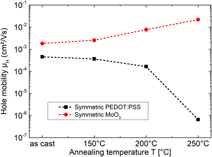Crossref Citations
This article has been cited by the following publications. This list is generated based on data provided by
Crossref.
Chang, Shu-yun
Lin, Guan-Ting
Cheng, Yu-Chieh
Huang, Jau-Jiun
Chang, Chiou-Ling
Lin, Chi-Feng
Lee, Jiun-Haw
Chiu, Tien-Lung
and
Leung, Man-kit
2018.
Construction of Highly Efficient Carbazol-9-yl-Substituted Benzimidazole Bipolar Hosts for Blue Phosphorescent Light-Emitting Diodes: Isomer and Device Performance Relationships.
ACS Applied Materials & Interfaces,
Vol. 10,
Issue. 49,
p.
42723.
Hleli, E.
Radaoui, M.
Ben Hamed, Z.
Romdhane, S.
Egbe, D. A. M.
and
Bouchriha, H.
2019.
Role of Electron Blocking Layer in Performance Improvement of Organic Diodes.
Journal of Electronic Materials,
Vol. 48,
Issue. 5,
p.
2794.
Alam, Shahidul
Gavrik, Alexey
Meitzner, Rico
Hoeppener, Stephanie
Dyakonov, Vladimir
Baumann, Andreas
Schubert, Ulrich S
and
Hoppe, Harald
2019.
Thermally induced degradation of PBDTTT-CT:PCBM based polymer solar cells.
Journal of Physics D: Applied Physics,
Vol. 52,
Issue. 47,
p.
475501.
Kim, Jinwook
Ouyang, Dan
Lu, Haifei
Ye, Fei
Guo, Yuwei
Zhao, Ni
and
Choy, Wallace C. H.
2020.
High Performance Flexible Transparent Electrode via One‐Step Multifunctional Treatment for Ag Nanonetwork Composites Semi‐Embedded in Low‐Temperature‐Processed Substrate for Highly Performed Organic Photovoltaics.
Advanced Energy Materials,
Vol. 10,
Issue. 15,
Chen, Yu-Hsin
Chen, Chia-Hsun
Chang, Chun-Ming
Fan, Bo-An
Chen, Deng-Gao
Lee, Jiun-Haw
Chiu, Tien-Lung
Chou, Pi-Tai
and
Leung, Man-kit
2020.
Control of π–π stacking in carbazole-benzimidazo〈1,2-f〉phenanthridines: the design of electron-transporting bipolar hosts for phosphorescent organic light-emitting diodes.
Journal of Materials Chemistry C,
Vol. 8,
Issue. 10,
p.
3571.
Alam, Shahidul
Anand, Aman
Islam, Md Moidul
Meitzner, Rico
Djoumessi, Aurelien Sokeng
Slowik, Josef
Teklu, Zekarias
Fischer, Peter
Kästner, Christian
Khan, Jafar I.
Schubert, Ulrich S.
Laquai, Frédéric
and
Hoppe, Harald
2022.
P3ht:Pcbm Polymer Solar Cells from a Didactic Perspective.
SSRN Electronic Journal ,
Alam, Shahidul
Anand, Aman
Islam, Md Moidul
Meitzner, Rico
Djoumessi, Aurelien Sokeng
Slowik, Josef
Teklu, Zekarias
Fischer, Peter
Kästner, Christian
Khan, Jafar I.
Schubert, Ulrich S.
Laquai, Frédéric
and
Hoppe, Harald
2022.
P3HT:PCBM polymer solar cells from a didactic perspective.
Journal of Photonics for Energy,
Vol. 12,
Issue. 03,
Lin, Sheng-Jie
Cheng, Yu-Chieh
Chen, Chia-Hsun
Zhang, Yong-Yun
Lee, Jiun-Haw
Leung, Man-kit
Lin, Bo-Yen
and
Chiu, Tien-Lung
2023.
New high-Tg bipolar benzimidazole derivatives in improving the stability of high-efficiency OLEDs.
Journal of Materials Chemistry C,
Vol. 11,
Issue. 1,
p.
161.
Alam, Shahidul
Petoukhoff, Christopher E
Jurado, José P
Aldosari, Haya
Jiang, Xinyu
Váry, Tomáš
Nasser, Hamza Al
Dahman, Amr
Althobaiti, Wejdan
Lopez, Sandra P Gonzalez
Alsufyani, Wejdan
Müller-Buschbaum, Peter
Nádaždy, Vojtech
Hoppe, Harald
and
Laquai, Frédéric
2024.
Influence of thermal annealing on microstructure, energetic landscape and device performance of P3HT:PCBM-based organic solar cells.
Journal of Physics: Energy,
Vol. 6,
Issue. 2,
p.
025013.



